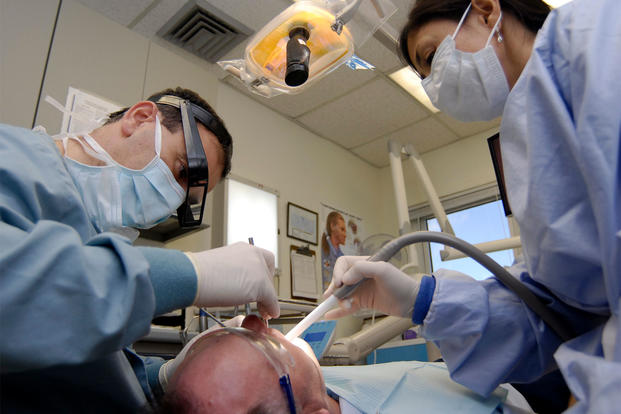Dentists in several states are warning reimbursement rates in the new Tricare dental contract are so low that many providers will be forced to stop participating in the plans and pass on higher out-of-pocket costs to military families.
The $2.9 billion Tricare Dental Plan (TDP) contract for the families of active-duty, Guard and reserve troops is set to move from MetLife to United Concordia on May 1. About 1.8 million beneficiaries are enrolled in the program. Military retirees are not impacted by the new contract.
Although the change comes with several expansions to care for users, including an increased yearly cost cap and lower premiums, it also includes a decrease to the in-network rates paid to dentists for their services.
That decrease, dentists told Military.com, in many cases will leave providers paying more to administer services than they will be reimbursed. The change, they said, will force many of them out of network and, in turn, increase the amount each Tricare user must pay out of pocket if they want to remain with their current provider.
United Concordia reimbursement rates are based on region. Company officials declined to provide rate examples to Military.com, saying they are proprietary information.
However, rate charts obtained by Military.com from providers in multiple regions show significant reimbursement rate drops. For example, a comparison chart for one region shows price drops in all but one of 51 common procedures -- with an average decrease of $33.72. Only one procedure, "protective restoration," saw a rate increase, of $2.36.
"We would actually lose money doing a surface resin filling," Dr. William Coppola, a pediatric dentist near San Antonio, Texas, said in an interview.
A common dental procedure for children, a one-surface resin, or white, filling under the new plan comes with an almost $19 reimbursement drop, he said. And when his team crunched the numbers, they found that accepting the United Concordia plan simply doesn't add up.
"We have employees," he said. "We have rent. We have electric and water. We have malpractice insurance. We have state licensure. It all adds up into your overhead."
Coppola, whose practice has served the area's large military population since 1980, says he is honored to help military families and loves serving his military clients. But given the pending changes to reimbursement rates, he doesn't know how any privately owned dental practice will be able to accept the plan because doing so will force them to operate at a loss.
"I don't know what to do," he said. "I'm in a quandary."
Under the current contract, users who choose both in and out of network dentists pay a set percentage out of pocket for each service, with those fees based on local maximum allowed prices set by the current contractor, MetLife.
In-network dentists accept one set of MetLife rates, while dentists who choose to be out of network are often reimbursed at higher rates than those in network -- a contract oddity that several dentists noted as "confusing."
The higher costs for an out-of-network dentist are counted against users' annual MetLife maximum, forcing them to reach their cap faster, and any difference between what MetLife will pay and the dentist's charge is paid out of pocket by the user.
For example, one out-of-network dentist in Clarksville, Tennessee, near Fort Campbell, Kentucky, charges $140 for the one-surface filling. The MetLife out-of-network allowed charge for that area is about $110. The user currently pays 20 percent of the allowed charge, or about $22, plus the balance from the dentist that MetLife does not cover, about $30.
Under the new contract, however, Tricare has fixed that reimbursement disparity, and both in and out of network dentists will be paid up to the new -- in most cases lower -- United Concordia maximum allowed rate.
Users who choose out-of-network dentists will still pay their cost share allowed by the plan, but will also be billed for the now higher overages not paid for by United Concordia. For example, at the Clarksville dentist, a user under the new plan will pay an additional almost $70, because the new plan will reimburse the dentist only about $71 instead of the previous almost $110.
In Clarksville, at least three of the area's privately owned pediatric dental clinics will be out of network, one such dentist there said. He said he has spoken to no privately owned general or pediatric dentists in the area who plan to stay within the United Concordia network.
"I just don't know anybody that I've talked to that is going to be in network," said Dr. Lary Deeds, who runs The Children's Dentist in Clarksville. "They just can't afford it."
According to contract documents, United Concordia must ensure that 95 percent of dental plan enrollees have an in-network general dentist within 35 driving miles of their place of residence and can obtain appointments with 21 days of requesting one.
Officials with United Concordia said they will meet their contract obligations by May 1. They declined to disclose how many dentists are in their Tricare network, saying that, like the rate charts, the information is proprietary.
"United Concordia remains committed to ensuring TDP enrollees have access to dental providers throughout the life of the TDP contract," said Sharon Duke, a United Concordia spokesperson.
The access obligation, however, doesn't extend to pediatric dentists, which are considered "specialty providers." Instead of a ratio mandate like that for general dentists that can be enforced through penalties, the specialty dentist network has no benchmarks included in the contract documents.
"While the network access standard only applies to general dentists, the contractor shall also provide a stable, high-quality network of specialty dental care providers that are available to all enrollees," the documents says. "Enrollees shall not be restricted as to their choice of provider."
Tricare officials said United Concordia has developed specific access standards for specialists, but declined to share them.
"The contractor did propose specific specialty standards which will be enforced on the upcoming contract," said Kevin Dwyer, a Tricare spokesman. "These are proprietary and may not be released. Beneficiaries are advised to contact United Concordia for assistance in locating a network specialty provider."
If United Concordia fails to meet the general dentist access standard, the contract document says, Tricare will designate the area as "non-compliant," and United Concordia will be forced to pay providers more, while also receiving a payment penalty from Tricare.
United Concordia officials said Tricare users can visit the United Concordia website to check whether their current dentist will be in the network.
However, a review by Military.com found that the listing does not reflect how many providers plan to be in network at the start of the contract. For example, none of the six dentists Military.com spoke to for this story plan to be in-network under the new contract, but all but one of them are listed on the United Concordia site as "in network." The dentists told Military.com they have until March 31 to give United Concordia 30-day notice that they will not be a part of the network on the May 1 start date.
Rather than keep patients from using his practice or pushing them to an in-network one, Deed says he expects the changes to instead cause them to simply visit the dentist less often. Using a dentist 35 miles away -- the access benchmark -- could result in an at least a one-hour round trip drive for dental care.
"The people who can't afford it won't go, and if you don't come in, these small things can turn into root canals," Deeds said. "When we do away with that, we're going to get more and more emergencies coming in."
Deeds said his office has given a letter to patients alerting them to the changes and suggesting they contact their elected officials to complain.
Multiple other dentists contacted Military.com to warn about the fee changes.
"We have served military families since the inception of the active-duty dependents dental plan," said one dentist near Fort Leavenworth, Kansas. "At this time, we are discontinuing our provider status. The fees allowed barely cover the dental supplies, lab fees etc. The acceptance of United Concordia's bid is a detriment to our military families. Most dentists in Leavenworth feel the same about the very low fees."
Dr. Carlen Blume, a pediatric dentist near San Antonio, said, "The only thing that is decreasing in my office is the reimbursement provided to me from the insurance companies. Somehow, we are being given reverse value to inflation."
She said, "That means drastic decreases result in providers no longer being able to accept [Tricare]. It also means you will have virtually no specialists available to you in some areas. Is that really providing your military families with the same coverage they have?"
Blume added, "I am sad to say I, too, will be dropping this coverage unless something is done to correct it, quickly."
-- Amy Bushatz can be reached at amy.bushatz@military.com.




























